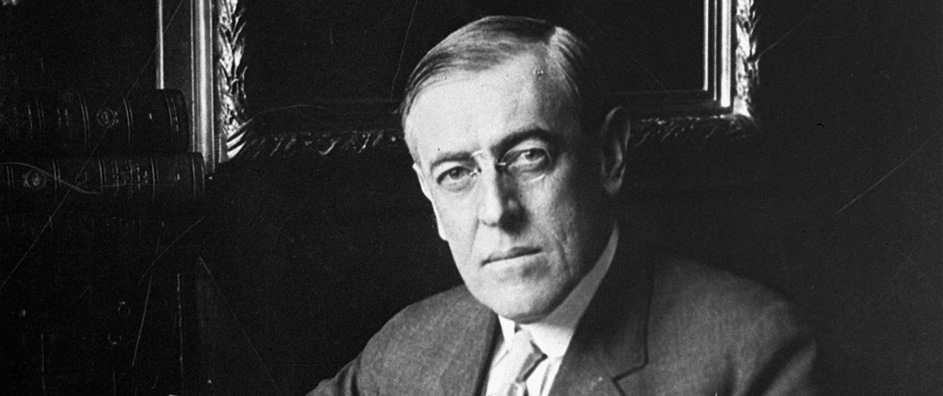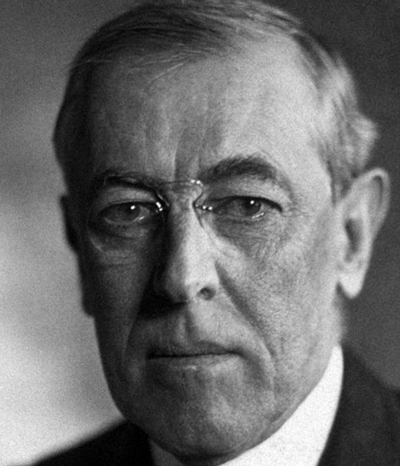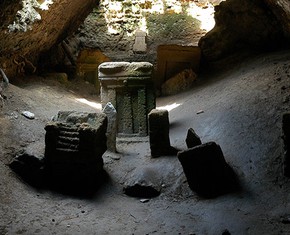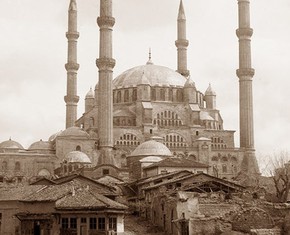The views expressed in our content reflect individual perspectives and do not represent the authoritative views of the Baha'i Faith.
Forty-four unique men have served as President of the United States.
History shows that U.S. Presidents have achieved many good things for Americans, some great, and some not so great. All were men. All were human. Each and every one made mistakes as we look back historically, yet, all were products of their times. Some helped change the times.
One President, Woodrow Wilson, is now being called racist for his views on equality. Eighteen of those gone before may just as easily have been called racist also, based on their ownership of slaves. Shall we tear down all the monuments and change the names of thousands of buildings, streets and highways, towns and cities named after them? Should we erase their notable achievements in the name of hindsight? Can we “read back” into history, and try to correct it ex post facto? Does pointing out their flaws—which were many, as in most people—have any beneficial effect or alter what we now consider as great? Or should we consider their positive attributes and accomplishments?
As a world leader, we should definitely recognize President Wilson’s groundbreaking attempt to establish a definitive league of nations that would address and adjudicate world problems. In this short series of essays, we’ll focus on that aspect of President Wilson’s life’s work.
Let’s start with a few excerpts from the soon-to-be-published biography of Woodrow Wilson by Michael P. Riccards. Mike has authored 15 books, including The Ten Greatest U.S. Presidents. A past college president three times over, Mike is also a close friend, a writing partner, and an independent observer and chronicler of history. With his permission, some of his observations on Woodrow Wilson:
Great men or women are often described as complicated, and especially we seek to understand the threads of their early being. In his brief life span no public personality so captivated the people of America and the world in general as Woodrow Wilson. Over a century later we still feel the pull of his influence. Historians do not agree whether he was a great president or a disaster; few stake out an intelligent middle ground. All admit that he was one of the most successful domestic policy presidents only rivaled by FDR, his protégé, and Lyndon Johnson, FDR’s protégé.
After being elected in 1912, Wilson hated almost clinically that… he had to spend most of his time on foreign affairs. He saw himself as a domestic reformer. But ironic it was as his term in office is most remembered by history for the Great War and the difficulties of the Treaty of Versailles, and finally America’s repudiation of the League of Nations.
The trigger for war was the 28 June 1914 assassination of Archduke Franz Ferdinand of Austria, heir to the throne of Austria-Hungary, by Yugoslav nationalist Gavrilo Princip in Sarajevo. This set off a diplomatic crisis…. Within weeks, the major powers were at war and the conflict soon spread around the world.
Diplomatically Wilson argued in May 1916 for a postwar League of Peace to uphold the rights of national sovereignty, territorial integrity, and freedom from aggression. Even TR [Theodore Roosevelt] and Taft had once supported a league and some of the more enlightened Europeans, including Pope Benedict XV, agreed. But the war leaders did not comment, preferring to fight in what each side saw as victory. Once again, and for the last time, on December 18, 1916, the president offered again to mediate the war, and he would ask each side what it would take to terminate the war and promote future security. The Central Powers insisted that victory was certain; the Allies demanded that the enemy’s empires be dismembered. Oddly enough the Second World War would be the beginning of the unraveling of empires of both European and Asian states. And the leader of that anti-colonial crusade would be a Wilson protégé—Franklin Delano Roosevelt.
In 1916, however, Wilson’s peace offer went nowhere:
President Woodrow Wilson
[Toward the end of the war] “The advisors to Wilson were called the “Inquiry” and headed up by a president of City College in New York City. The group provided the president with a series of objectives from Berlin to Baghdad with particular emphasis on the Slavic area. It urged that America use its financial assets to prevail, a position that the president held. …the Inquiry laid out a statement of peace terms, and focused on “territory, territory.” The report was released on December 23, 1917. The forces of Lenin in Russia on their own pushed for an end to forcible annexation of territory seized during the war, restoring independence, protecting minorities, safeguarding weaker nations against boycotts and blockade, and allowing national groups to determine their public future by referendum. Wilson would be impacted by those principals as well as by the Inquiry report. While the president was working on his own statement of objectives, the Fourteen Points, Prime Minister David Lloyd George was giving a speech in London supporting “self-determination,” this from the guardian of the British Commonwealth.”
Several days later Wilson appeared before Congress with his program of world peace. It is frequently cited in his time and in ours that Wilson was a total failure in getting his ideas accepted at the peace conference, the usual charges that Wilson sold out his principles for the establishment of a League of Nations.
But as we now know, Wilson’s Fourteen Point peace plan did not fail in the long term. Instead, it served as the basis for the Armistice and the Treaty of Versailles, advancing international relations and serving as the formative document for the League of Nations, the first attempt at a world governing body that could enforce global peace. Under the onslaught of the aggression of the Axis powers the League fell apart at the dawn of World War II, but then its founding international principles reasserted themselves in a new incarnation—the United Nations—at the close of that war in 1945. Wilson’s Fourteen Points, which replicate Baha’u’llah’s teachings in so many ways, still have an enormous influence on diplomacy and international relations today.
Baha’is believe that those lofty, essentially spiritual principles—global peace, disarmament, the rights of all and an end to colonial oppression—continued and expanded throughout the world because they represent the emerging spirit of the age. First given to the world by Baha’u’llah in the middle of the previous century, those Baha’i principles call on humanity and its leaders to observe peace and justice, to disarm and to end all war. The Baha’i writings praise President Wilson for his initial advocacy of those high aims:
The President of the Republic, Dr. Wilson, is indeed serving the Kingdom of God for he is restless and strives day and night that the rights of all men may be preserved safe and secure, that even small nations, like greater ones, may dwell in peace and comfort, under the protection of Righteousness and Justice. This purpose is indeed a lofty one. I trust that the incomparable Providence will assist and confirm such souls under all conditions. – Abdu’l-Baha, Selections from the Writings of Abdu’l-Baha, p. 109.
Next: Wilson’s Points: The Dawn of Universal Peace
You May Also Like
Comments


















orden será establecido
y todo lo que cuestionemos será en vano.Disfrutar del
proceso Vivir y contribuir en el mejoramiento del mundo en la medida que podáis.
saludos a todos
I did not intend my posting to be a criticism of your article, nor of any comments made about it. How hypocritical that would have been, given the nature of my posting. Rather, I merely wished to point out that those supernaturally inspired Leaders of the Cause—the Master and the Guardian—were fully aware, way more than we could be, of the full nature of President Wilson’s character.
Since They ardently obeyed the stricture against negativity, and since `Abdu'l-Bahá is the guide for our behavior, we have a glimpse into how we must address issue and principles—such ...as racial unity and abstaining from both praise and criticism of politicians and parties—vis-à-vis those other principles to which we of the half-light hold so dear. To the extent that he did so, `Abdu'l-Bahá and Shoghi Effendi welcomed Wilson’s accompaniment of the Cause.
Now that the Universal House of Justice has shown and taught us the importance of accompaniment, we will find ourselves leagued with those, such as Mr. Wilson, who support only one or several of the foundations of world unity. This state is only a further step in the continuum of what we already find within the body of believers. I have met those whose purity of love for racial unity made me cry with joy. I have also commingled with those in our Community, such as myself, who need much more self-enlightenment along this path. Much. More.
I think we could safely postulate that within every presidential administration there existed some good and some evil, with the balance wavering widely from election to election. While it is important to know our history, we Bahá’ís have a plethora of heroes—also flawed—from our own history to inspire us.
Great harm has emanated, both domestically and globally, from the USA. The events, their sources and their consequences are still relevant. The individuals who committed that harm are irrelevant, for there are always so many more queued behind eager to violate the laws of God. Sadly, those who should have prevented Wilson’s racially motivated acts are the same ones who should have prevented Hitler’s. We are those.
Nowhere do the Writings lavish praise on Greg Billington. God measures Wilson’s account. It is possible that He values Wilson’s contributions far more than He does mine.
Reviewing the structures that have fallen is fatiguing when we ourselves have so many to build. The Old Order passes. Let it. The Anointed Jesus, I think, instructed us how to regard that passing when He preached that we should let the dead bury the dead; and when He admonished His disciples to shake the very dust of the Old Order from their sandals as they journeyed from town to town. The Báb reiterate these charges to the Letters of the Living. “♪ Let it go! ♫” —Elsa
Well - with that in mind, to answer the question - Wilson was BOTH a pacifist and a racist. The false dichotomy of the title does a disservice to the Faith, in my opinion.
On no subject are the Bahá’í teaching more imperative and uncompromising than on the requirement to abstain from faultfinding. Christ spoke very strongly on the same subject, but it has now become usual to regard the Sermon on the Mount as embodying “Counsels of Perfection” which the ordinary Christian cannot be expected to live up to. Both Bahá’u’lláh and ‘Abdu’l-Bahá are at great pains to make it clear that on this subject They mean all They say. We read in the Hidden Words:—
O Son of Man!
Breathe not the sins of others so long as thou ...art thyself a sinner. Shouldst thou transgress this command, accursed wouldst thou be, and to this I bear witness.
O Son of Being!
Ascribe not to any soul that which thou wouldst not have ascribed to thee, and say not that which thou doest not. This is My command unto thee, do thou observe it.
‘Abdu’l-Bahá tells us:—
To be silent concerning the faults of others, to pray for them, and to help them, through kindness, to correct their faults.
To look always at the good and not at the bad. If a man has ten good qualities and one bad one, to look at the ten and forget the one; and if a man has ten bad qualities and one good one, to look at the one and forget the ten.
Never to allow ourselves to speak one unkind word about another, even though that other be our enemy.
To an American friend He writes:—
The worst human quality and the most great sin is backbiting, more especially when it emanates from the tongues of the believers of God. If some means were devised so that the doors of backbiting could be shut eternally, and each one of the believers of God unsealed his lips in praise of others, then the teachings of His Holiness Bahá’u’lláh would be spread, the hearts illumined, the spirits glorified, and the human world would attain to everlasting felicity.
Bahá’u’lláh and the New Era, pp. 82-83
The Baha’i Wilsonian Myth
In the Baha’i vision of America, America’s world role is to foster ideal international relations. Such world diplomacy and “international cooperation will, in turn, prove hugely instrumental in unifying the world (which, after all, is the principal purpose of the Baha’i Faith). In its religious myth (or, sacred history) of America, several Baha’i ...texts single out, for distinction, an American president who tried to do exactly that: Woodrow Wilson. Indeed, President Wilson was a “statesman whose vision both ‘Abdu’l-Baha and Shoghi Effendi have praised.”46 These passages lionize President Woodrow Wilson by focusing exclusively on his legacy as an internationalist. Such praise is both deserved and controversial. Wilson is immortalized in history as an internationalist who championed the formation of the League of Nations (precursor of the United Nations). Historians generally agree that Woodrow Wilson, in so doing, was the first U.S. president to define America’s world role. This largely explains why Baha’i sources attach considerable religious significance to President Wilson. Yet Wilson was also a racist, which fact finds no purchase in the Wilsonian idealism given such prominence in Baha’i texts. Shoghi Effendi states that Wilson holds a special place as the most honored statesman in the Baha’i writings:
“To her President, the immortal Woodrow Wilson, must be ascribed the unique honor, among the statesmen of any nation, whether of the East or of the West, of having voiced sentiments so akin to the principles animating the Cause of Baha’u’llah, and of having more than any other world leader, contributed to the creation of the League of Nations—achievements which the pen of the Center of God’s Covenant [‘Abdu’l-Baha] acclaimed as signalizing the dawn of the Most Great Peace.”47
Note that the passage distinguishes this American president as “the immortal Woodrow Wilson,” notwithstanding the fact that Wilson was an erstwhile racist. While racism is absolutely antithetical to Baha’i principles of unity, the Baha’i Woodrow Wilson myth is consistent with the function of mythmaking in general, which is to confer meaning and inspire action. Myths, after all, are about storytelling in order to moralize and incentivize, not to memorialize the naked facts for their own sake. Here, the purpose of idealizing the past is to inspire an ideal future. In a word, Wilsonian idealism is internationalism.48
A comparison “of Wilsonian idealism and Baha’i principles shows a powerful resonance that is nothing short of resounding harmonics. Stephen Skowronek condenses and characterizes Wilsonian idealism as effectively as any of his predecessors have done, if not more so:
“‘Peace without victory’; self-determination; the equality of states; renunciation of indemnities and annexations; rejection of the balance of power; promotion of the community of powers, of collective security under a league of nations, of a world safe for democracy—these were the principles Wilson enunciated in 1917, and these were the principles that catapulted him into the top ranks of democratic visionaries in world history.”49
On these resonances between Wilsonian internationalism and Baha’i principles of ideal international relations leading to world unity, ‘Abdu’l-Baha, observed: “As to President Wilson, the fourteen principles which he hath enunciated are mostly found in the teachings of Baha’u’llah and I therefore hope that he will be confirmed and assisted.”50 In ‘Abdu’l-Baha’s estimation, Wilson’s enlightened internationalism attracted divine favor:
“The President of the Republic, Dr. Wilson, is indeed serving the Kingdom of God for he is restless and strives day and night that the rights of all men may be preserved safe and secure, that even small nations, like greater ones, may dwell in peace and comfort, under the protection of Righteousness and Justice. This purpose is indeed a lofty one. I trust that the incomparable Providence will assist and confirm such souls under all conditions.”51
Thus, in the Baha’i view, President Wilson’s principles of internationalism were providentially inspired. According to Shoghi Effendi, the “ideals that fired the imagination of America’s tragically unappreciated President” were “acclaimed as signalizing the dawn of the Most Great Peace” by “‘Abdu’l-Baha, through His own pen.”52
Such is the Wilsonian myth. Yet the Baha’i writings do not idealize Wilson so much as they champion Wilsonian idealism.53 In lionizing Wilson the statesman, and in overlooking Wilson the racist, the Baha’i Wilsonian myth lives up to the purpose of a religious myth of America, as idealized or sacralized history exemplifying key precepts and practices.
Excerpt From: Christopher Buck. “God & Apple Pie: Religious Myths and Visions of America.” iBooks.
"ABDUL BAHA LAUDS PRESIDENT WILSON: Spiritual Ambassador Forwards Message. Baha'o'Llah Predicted Downfall of Germany Long Ago." Boston Daily Globe (April 27, 1919): p. 9.
President Wilson's views on race are briefly discussed in God & Apple Pie: Religious Myths and Visions of America, pp. 312–314.